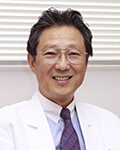The 12th Annual Meeting of the Japanese Society of Gastroenterological Surgery President Mitsuru Sasako(Division of Upper Gastrointestinal Surgery, Department of Surgery, Hyogo College of Medicine) |
 |
Japan has played a pivotal role in modern gastroenterological surgery. Most notably, Japan has perfected surgical concepts and elevated the practice of cancer treatment. These achievements have exerted a profound influence on numerous gastroenterological surgeons in the West, a fact reflected in the great feats of numerous Western surgeons in the late 20th century. The positive impact of Japanese surgeons is comparable to the influence the Genroku culture artists of the Edo period had on many of the Impressionists in the late 19th century. Japan’s unique surgery culture is founded upon a desire to “improve and perfect skills.” This culture has produced medical experts with a uniform level of skill and craftsmanship, or at the very least medical practitioners heading in the same direction. There have been times over the years when this culture has given rise to “prevailing forms of surgery” which were uncritically accepted, but ultimately caused patients more harm than good. Nevertheless, this very history and culture paved the way for Japan’s subsequent success in randomized controlled trials of cancer surgery, a feat no other country had yet to achieve in a research field specifically for comparing surgical techniques. The harder doctors work to elevate their skills, the deeper the analysis they can conduct in surgery and anatomy. Practitioners who uncritically focus too much on elevating their skills tend to strive to master extremely difficult forms of surgery, rather than considering what is ultimately best for the patient. That being said, as long as these doctors continue to scientifically verify the importance of their skills after they obtain a certain level of expertise, this misplacement of priorities in surgeries will prove to be only a minor glitch within the course of history.
Our country has also made great contributions to the early diagnosis of gastroenterological cancer worldwide, and has helped to accelerate the advancement of minor resection through the detection of early gastrointestinal tract cancer and hepatic cancer. As a result, the number of early-stage cancer patients who require no surgery at all is rapidly rising. Today, the number of patients with early gastric cancer who undergo endoscopic treatment outnumbers those who undergo surgery. Yet for those who have surgery, , it makes little difference how small the incision is if part of the stomach has been removed. Unfortunately, research into forms of surgical cancer treatment that preserve the stomach have stalled, and at this time ESD represents the least invasive form of treatment which does not involve removing part of the stomach. Gastroenterological surgeons need to work closely with gastroenterological internists and gastroenterological endoscopy technicians to build a future in which no early gastric cancer patients will have to undergo gastric resection.
In this regard, I believe this meeting will provide internists and surgeons with greater opportunities to discuss matters related to sensitive areas of treatment selection. In addition, it will address issues that must be tackled by multiple specialists, such as diseases which require different forms of internal therapy after surgical treatment.
The future of medicine envisioned by the government shows that the era in which surgeons perform everything, from diagnosis to treatment and follow-up, is rapidly coming to a close. In the future, work will be further divided among medical practitioners with a higher level of expertise. At the same time, primary care doctors will be largely responsible for seeing patients. I hope this event will provide surgeons specializing in gastroenterological diseases with an opportunity to learn about important issues, such as how to work collaboratively with other specialists, that will come to the forefront in this new era. I would like to see both young doctors and seasoned practitioners actively participate in discussions and come away feeling glad they came to this meeting. Thank you.


